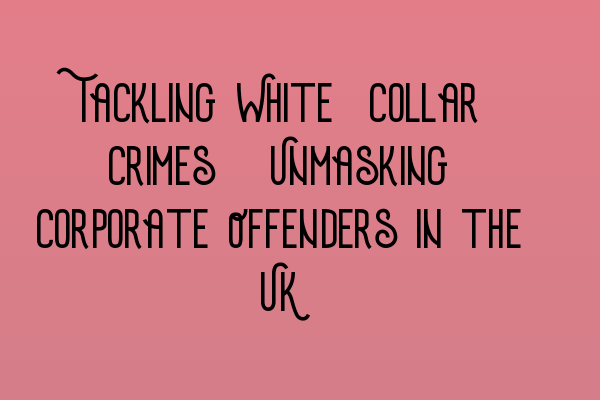Tackling White-Collar Crimes: Unmasking Corporate Offenders in the UK
White-collar crimes pose a significant challenge to the integrity of the UK’s financial and business sectors. These offenses, often committed by individuals within corporations, can have far-reaching consequences for individuals, companies, and the overall economy. It is of utmost importance that we tackle these crimes head-on, bringing corporate offenders to justice in order to maintain the trust and integrity of our financial systems.
The Nature of White-Collar Crimes
White-collar crimes encompass a wide range of offenses, including fraud, embezzlement, money laundering, insider trading, and bribery, among others. These offenses are typically committed by individuals in positions of trust and power within corporations, taking advantage of their knowledge, access, and influence for personal gain.
In recent years, the frequency and complexity of white-collar crimes have increased, posing significant challenges to law enforcement agencies and regulatory bodies. In response, the UK legal system has undergone substantial reforms to enhance its ability to detect, investigate, and prosecute corporate offenders.
Identifying and Investigating Corporate Offenders
Detecting and unmasking corporate offenders require a multi-faceted approach involving cooperation between various stakeholders, including law enforcement agencies, regulatory bodies, financial institutions, and the legal profession. The process begins with the identification of suspicious activities and reports of potential wrongdoings.
Financial institutions play a crucial role in identifying potential white-collar crimes through their robust compliance and monitoring systems. Suspicious transactions or activities trigger internal investigations, which are then reported to relevant authorities, such as the Serious Fraud Office (SFO), the Financial Conduct Authority (FCA), or the National Crime Agency (NCA).
Once suspicions are raised, investigative teams comprising skilled professionals from various fields, including accountants, lawyers, and forensic specialists, are deployed to gather evidence and build a case against the offenders. These investigations often involve complex financial analysis, tracing money flows, and uncovering hidden assets.
The Role of Lawyers in Fighting White-Collar Crimes
The legal profession plays a pivotal role in the fight against white-collar crimes. Highly skilled and specialized solicitors provide crucial legal services throughout the entire process, including pre-trial advice, representation during investigations, negotiation of plea bargains, and representation in court.
A successful prosecution in a white-collar crime case requires lawyers with a deep understanding of the complex legal and regulatory frameworks governing these offenses. They must have expertise in financial analysis, corporate law, and criminal procedure to ensure their clients’ rights are protected and that any evidence obtained is admissible in court.
At SQE Criminal Law & Practice Law UK, our team of experienced solicitors specializes in handling white-collar crime cases. We are committed to staying updated with the latest legal developments and are well-versed in the intricacies of corporate offenses. Our expertise allows us to effectively advocate for our clients and assist in bringing corporate offenders to justice.
The Importance of Education and Training
As white-collar crimes become increasingly complex, it is essential to equip legal professionals with the knowledge and skills necessary to tackle these offenses effectively. The introduction of the Solicitors Qualifying Examination (SQE) by the Solicitors Regulation Authority (SRA) aims to ensure that solicitors are well-prepared to address the challenges posed by white-collar crimes.
Preparing for the SQE involves rigorous training and examination in core areas of legal practice, including criminal law and practice. Candidates can benefit from SQE 1 Practice Exam Questions and SQE 1 Practice Mocks FLK1 FLK2 to enhance their understanding of criminal law and familiarize themselves with the format of the exam.
For those looking to specialize in criminal law, SQE 2 Preparation Courses offer comprehensive training tailored specifically for criminal law practitioners. These courses provide in-depth knowledge and practical skills required to handle white-collar crime cases effectively and ethically.
Conclusion
Tackling white-collar crimes and unmasking corporate offenders is an ongoing challenge in the UK. By employing a multi-faceted approach that involves cooperation between various stakeholders, including law enforcement agencies, regulatory bodies, financial institutions, and the legal profession, we can work towards the eradication of these offenses.
At SQE Criminal Law & Practice Law UK, our team of skilled solicitors is dedicated to fighting white-collar crimes and ensuring justice is served. We stay at the forefront of legal developments and possess the expertise necessary to effectively represent our clients. Together, we can uphold the integrity of our financial systems and protect the interests of individuals and businesses alike.
For more information about the SQE and the preparation courses available, please refer to SRA SQE Exam Dates.
